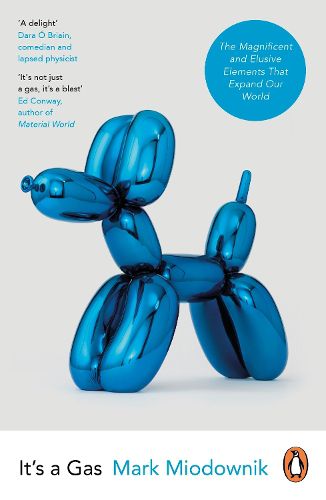Readings Newsletter
Become a Readings Member to make your shopping experience even easier.
Sign in or sign up for free!
You’re not far away from qualifying for FREE standard shipping within Australia
You’ve qualified for FREE standard shipping within Australia
The cart is loading…






The secret life of gases from the author of the best-selling, prize-winning Stuff Matters
Why are most gases invisible, odourless and tasteless? Why do some poison us and others make us laugh? And why do some power our engines while others make drinks fizzy? In It's a Gas, Mark Miodownik masterfully reveals an invisible world through his unique brand of scientific storytelling.
Taking us back to that exhilarating - and often dangerous - moment when scientists tried to work out exactly what they had discovered, Miodownik shows that gases are the formative substances of our modern world, each with its own weird and wonderful personality.
We see how seventeenth-century laughing gas parties led to the first use of anaesthetics in surgery, how the invention of the air valve in musical instruments gave us bicycles, cars and trainers, and how gases made us masters of the sea (by huge steamships) and skies (via extremely flammable balloons). This delight of a book reveals the immense importance of gases to modern civilisation.
$9.00 standard shipping within Australia
FREE standard shipping within Australia for orders over $100.00
Express & International shipping calculated at checkout
The secret life of gases from the author of the best-selling, prize-winning Stuff Matters
Why are most gases invisible, odourless and tasteless? Why do some poison us and others make us laugh? And why do some power our engines while others make drinks fizzy? In It's a Gas, Mark Miodownik masterfully reveals an invisible world through his unique brand of scientific storytelling.
Taking us back to that exhilarating - and often dangerous - moment when scientists tried to work out exactly what they had discovered, Miodownik shows that gases are the formative substances of our modern world, each with its own weird and wonderful personality.
We see how seventeenth-century laughing gas parties led to the first use of anaesthetics in surgery, how the invention of the air valve in musical instruments gave us bicycles, cars and trainers, and how gases made us masters of the sea (by huge steamships) and skies (via extremely flammable balloons). This delight of a book reveals the immense importance of gases to modern civilisation.